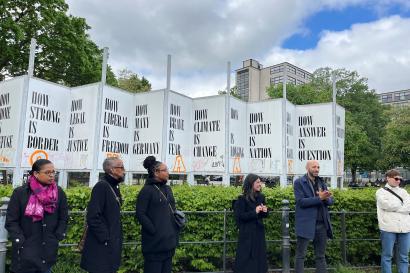As part of our mission, we have a commitment to the representation and integration of diverse perspectives, cultures, and ideas at every level of our organization. We believe that the work is ongoing and that we’re all better when we are committed to the work of learning and growing together.
That’s why we hosted our second-annual Diversity Workshop Abroad (DWA), this time at our Berlin Center, during the Spring 2024 semester. The workshop was led by IES Abroad U.S. staff Brittani Smit, Noelle Baldwin, Quinn McMurtrey, and Ruby Shields, along with Berlin Center Director Barbara Finke and Center staff. DWA participants explored the complexities of Berlin’s past and present, incorporating the role of racism, antisemitism, migration, colonialism, and war, allowing these concepts to deepen their understanding of the city.











